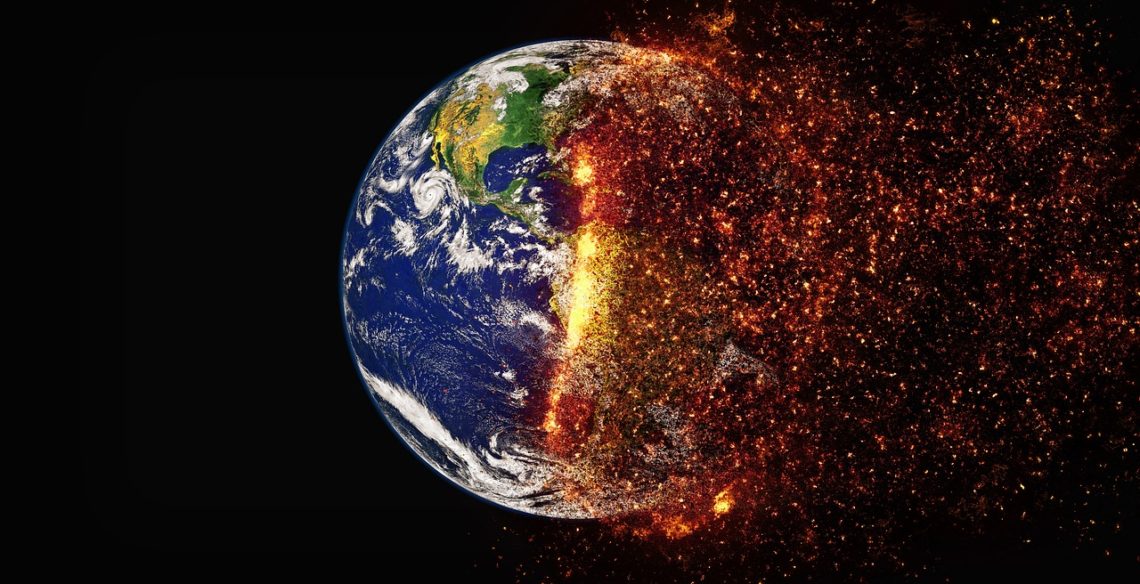by Nikki Castro
On Earth, human activity is impacting the natural climate over the last century. The burning of fossil fuel is contributing to the build of CO2 in the atmosphere while the population is also exhausting natural resources. “There are several causes of recent climate change, but all have something in common – people” (UCAR). Climate change happens when certain gases such as sulfur monoxide, carbon monoxide, and nitrogen oxide, are released into the atmosphere and retain the heat, a side effect from factories, agriculture, transportation that runs on gasoline, and deforestation. In the US alone there are already impacts, examples include the Northeast where the agriculture is being affected by heat waves and heavy downpour. In the Southwest, there’s an increase in heat, droughts, and insect outbreaks. In the Midwest, extreme heat, and heavy downpour is already affecting infrastructure (Nasa). If one looks at this in a biological way, humans are parasitic upon this Earth, yet this topic is rarely brought up in United States politics, or rarely acted upon.
Although it is easy to assume that the sun’s energy output would cause the climate to change, as indeed a decrease in solar activity between 1600s to the 1800s is thought to have played a role in a little ice age in Greenland, there’s not enough evidence to prove the case. For example, “if the warming were caused by a more active sun, then scientists would expect to see warmer temperatures in all layers of the atmosphere. Instead, they have observed a cooling in the upper atmosphere, and a warming at the surface and in the lower parts of the atmosphere” (Nasa). This means solar irradiance alone is not enough to produce the climate changes currently happening.
It is hard to prove that climate change is currently happening, as different scientists from different backgrounds are needed to get a concrete understanding of the changes in distinct environments around the globe, nevertheless, there’s compelling evidence that climate change is real. For example, global warming has risen “1.62 degrees Fahrenheit (0.9 degrees Celsius) since the late 19th century” (Nasa), the ocean has warmed “more than 0.4 degrees Fahrenheit since 1969” (Nasa). There has been shrinking of the ice sheets, as “Greenland lost an average of 281 billion tons of ice per year between 1993 and 2016, while Antarctica lost about 119 billion tons during the same time period” (Nasa). There’s also visible snow cover decrease and glacial retreat. This could be clearly seen when I visited Exit Glacier in Seward, Alaska as the terminal has retreated more than 200ft in the past 10 years. Also, there’s been an increase of sea level, declining of artic sea ice, ocean acidification, and extreme events such as stronger hurricanes, and record-breaking heat and rainfall. If not convinced yet, “multiple studies published in peer-reviewed scientific journals show that 97 percent or more of actively publishing climate scientists agree” (Nasa), that climate change trends are due to human activity.
Climate change is a controversial topic around the world and although most countries agree that it is a real problem endangering the livelihood of the population, the United States of America, the world’s “greatest” superpower, doesn’t. American opinions are divided into three categories, Americans that believe the climate change is due to human activity (48%), those that believe there’s no evidence (20%) and finally those that believe climate change is due to natural causes (31%). This divide mixed with politics and party systems takes climate change to an impasse. On climate change matters conservative Republicans are “less inclined to anticipate negative effects from climate change or to judge proposed solutions as making much difference in mitigating any effects” (Funk and Kennedy). While liberal Democrats “see negative effects from climate change as very likely and believe an array of policy solutions can make a big difference” (Funk and Kennedy). For example, the allegations of the Trump administration are that climate change is a hoax and it only takes jobs away but that’s not the case as the investment in climate action is already creating jobs. “In renewable energy, the US solar industry is creating jobs twenty times faster than the overall economy, while the world’s largest renewable energy job market is in China, with 3.4 million working in the industry” (Burrow). Renewable energy develops jobs and although individuals are more likely to trust based on their political orientation, it is important that their understanding of climate change be fact-checked.
Often, individuals in America gather information indirectly from scientists, ranging from nonscience sources, news sites, political activists, friends, and family. As people choose to watch and follow those that match their own views and opinions, often their information has a biased flow. This then leads to a lesser understanding of climate change and its impact on the world, while other countries believe that climate change is a serious problem that should be dealt with. “For instance, fully 90% of Brazilians say climate change is harming people now. Europeans are also particularly likely to hold this opinion. However, only 41% of Americans believe people are being harmed by climate change today” (Adu-Wusu). Americans have a smaller percentage of believers than Mexico, Canada, South Korea, Australia, Germany, Italy, Spain, Argentina and Japan (Downing).
Different agreements and resolutions have been set in place such as The Paris Agreement. The agreement is set to “confluence of international climate policy, carbon science and communications to catalyze agreement between bottom-up greenhouse gas inventories and top-down atmospheric measurements” (ParisAgreement). It brings the nations together into a common understanding to combat climate change and adapt to the effects as well. The Trump administration pulled the US from this agreement. Another is IPCC, the Intergovernmental Panel on Climate Change, it provides the world with objective truths about climate change and its political and economic impacts. The IPCC is open to all country member of UNEP, United Nations Environmental Program and WMO, World Meteorological Organization and as of the date the United States participates in this, yet it’s not enough to impact any industries or businesses as barely anything from the IPCC is ever advertised.
If nothing gets done to leave a lesser carbon footprint, cut fossil fuels, and stop deforestation, there will be changes in precipitation, hurricanes will become stronger and more intense, there will be more draught and heat waves, and the artic will be ice free (Nasa). It is important to get the right facts toward global warming and not rely on fake news, as its going to be the first step towards the betterment of the world. The United States of America is not on the right track under its current administration, but with the help of its citizens and more profound understanding about climate change, its track can be fixed. Just remember to take an initiative and vote.
References
Adu-Wusu, K. “Tank 26F-2F Evaporator Study.” 2012, doi:10.2172/1059829. “Americans Believe Climate Change Is Occurring but Disagree on Why.” ScienceDaily,
ScienceDaily, 19 Apr. 2011, www.sciencedaily.com/releases/2011/04/110419101239.htm.
Burrow, Sharan, and International Trade Union Confederation. “How Will Climate Change Affect Jobs?” World Economic Forum, www.weforum.org/agenda/2015/12/how-will-climate-change-affect-jobs/.
“Climate Change Causes: A Blanket around the Earth.” NASA, NASA, 8 Aug. 2018, climate.nasa.gov/causes/.
Downing, Thomas E. “Views of the Frontiers in Climate Change Adaptation Economics.” Wiley Interdisciplinary Reviews: Climate Change, vol. 3, no. 2, 2012, pp. 161–170., doi:10.1002/wcc.157.
Funk, Cary, and Brian Kennedy. “Americans’ Views on Climate Change and Climate Scientists.” Pew Research Center: Internet, Science & Tech, Pew Research Center: Internet, Science & Tech, 26 Oct. 2016, www.pewinternet.org/2016/10/04/public-views-on-climate-change-and-climate-scientists/.
“Why Is Climate Changing Today?” Why Is Climate Changing Today? | UCAR Center for Science Education, scied.ucar.edu/shortcontent/why-climate-changing-today.parisagreement.org/






One Comment
Julia
A very informative essay I learned many interesting things. I learned that china has the world’s largest renewable energy market. I appreciate how you make it apparent for individuals to double check information they are receiving. There is a lot of fake news out there. Another thing i appreciate is how you sense the passion in your writing.